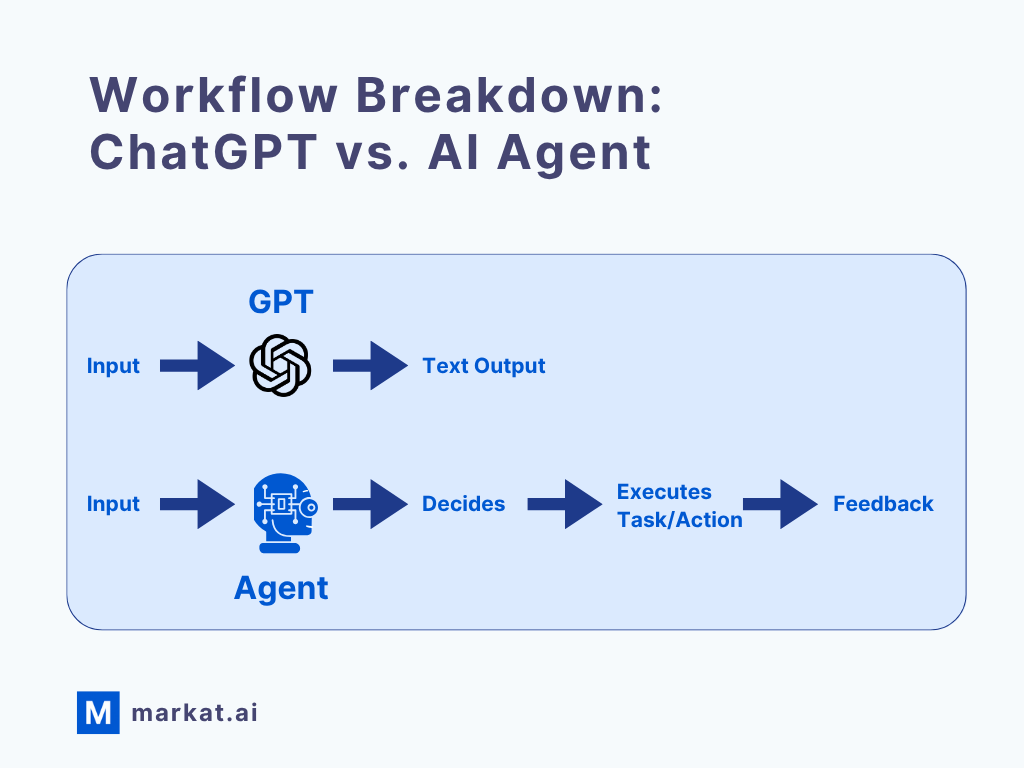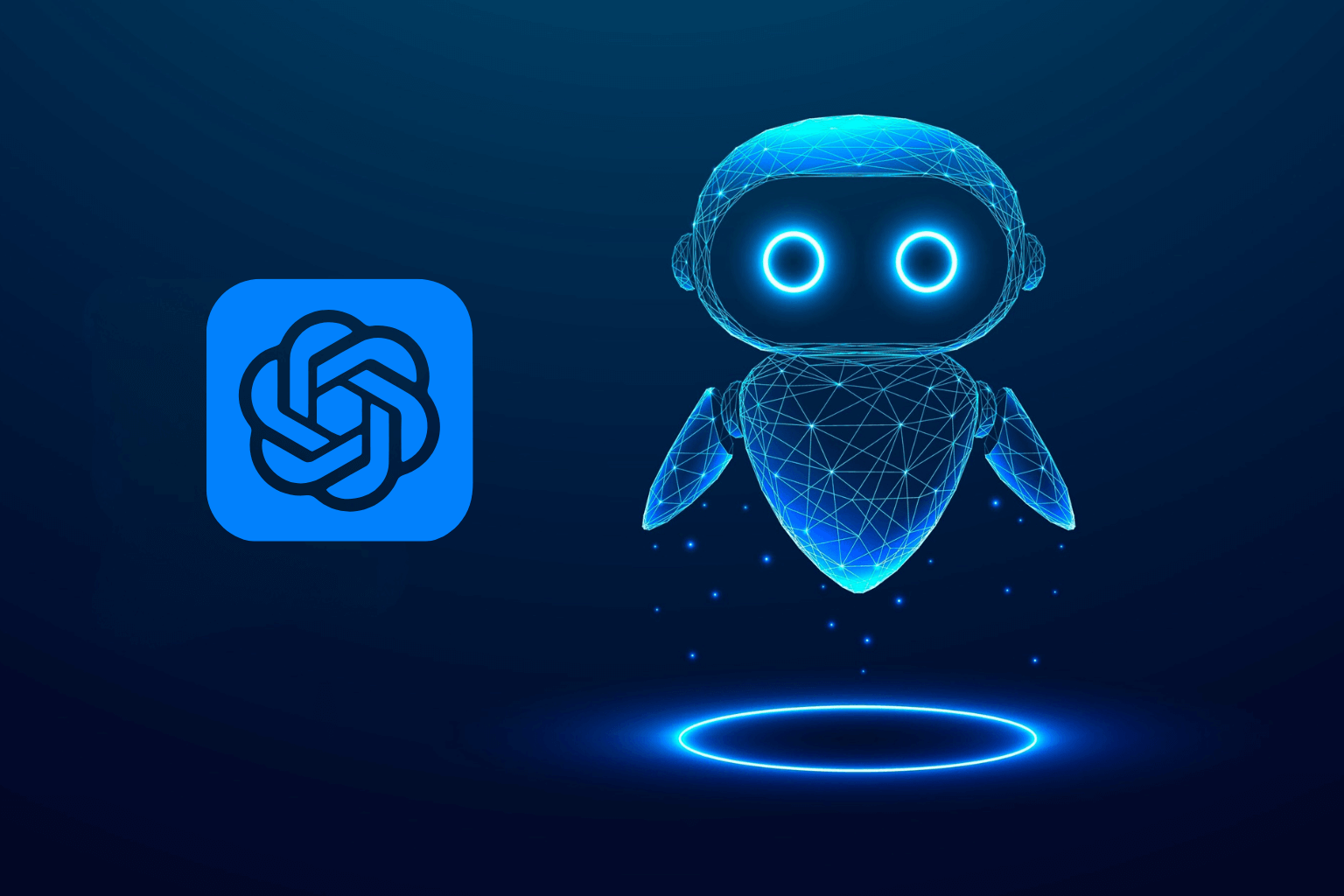Introduction
ChatGPT brought AI into mainstream consciousness. But now everyone’s talking about “AI agents” in every convesation I see, whether its on LinkedIn, startup pitches, Reddit threads, and developer communities. The noise makes it hard to separate reality from hype.
At Markat.ai, we run a marketplace specifically built for AI agents and tools. Every day, business owners, service providers and marketers ask us: “What’s the difference between ChatGPT and an AI agent?”
Here’s your clear, practical answer and explanation in simple terms.
What is ChatGPT?
ChatGPT is OpenAI’s conversational AI, based on a Large Language Model (LLM). It generates a coherent response by predicting the next words based on massive training data.
And now in simpler words: ChatGPT is a computer program you can chat with. It “learned” by reading huge amounts of writing, and when you ask it something, it picks words that best fit to give you a helpful, human-like reply.
ChatGPT’s strengths:
- Human-like conversation
- Content creation (emails, blogs, summaries)
- Deep research
- Answering complex questions
- Clearly explaining concepts
But crucially, ChatGPT is fundamentally reactive. It waits for your prompts and cannot autonomously execute tasks.
Limitations of ChatGPT:
- No real-time data or live interaction with external systems
- Can’t independently execute workflows or tasks
- Limited to generating text responses only
What is an AI Agent?
An AI agent doesn’t just respond. It acts independently by making decisions, initiating tasks, integrating external tools, and adapting dynamically to real-time context, a level of autonomy that sets AI agents apart and explains how they work.
Put simply:
- ChatGPT responds.
- An AI agent acts.
ChatGPT vs. AI Agent: Quick Comparison
| Feature | ChatGPT | AI Agent |
|---|---|---|
| Autonomy | Reactive, waits for input | Proactive, acts independently |
| Memory & Context | Short-term, limited | Long-term, continuous learning |
| Tool Integration | Limited external integration | Actively integrates with apps/APIs |
| Task Execution | Text-output only | Executes multi-step tasks/actions |
| Decision Logic | Predictive text only | Autonomous decision-making |
Workflow Breakdown: ChatGPT vs. AI Agent

Here’s how the workflows differ visually:
- ChatGPT: provides reactive text output.
- AI agents: decide, execute tasks, and offer feedback.
Real-World Examples: ChatGPT vs. AI Agents
Practical scenarios to illustrate:
Customer Support:
- ChatGPT: Answers FAQs reactively.
- AI Agent: Handles full interactions, logs data, escalates, schedules follow-ups autonomously.
Marketing:
- ChatGPT: Suggests ad copy.
- AI Agent: Generates ad copy, autonomously runs tests, optimizes campaigns based on real-time results.
Coding:
- ChatGPT: Offers code snippets.
- AI Agent: Independently codes, tests, deploys, monitors, and updates applications.
AI Agent Ecosystem Today (July 2025 Update)
The AI landscape shifted again on July 17, 2025, with OpenAI launching ChatGPT Agent, combining earlier tools into a fully autonomous agent system.
Key features of ChatGPT Agent:
- Autonomous web browsing, code execution, data analysis
- Creation of editable documents, reports, and presentations
- Handles complex multi-step tasks independently
OpenAI’s launch marks a significant move from reactive chatbots toward fully autonomous tools.
Why This Matters for Developers
In conversations I’ve had with AI developers, a recurring frustration emerges: they build impressive agents and tools but hit a wall. One developer described it perfectly:
“I built something useful, got stars on GitHub, even showcased it on Reddit and in my Discord communities, but now what? How do I know if anyone needs it? How do I make a real product out of it that I can sell?”
This frustration highlights the importance of understanding the difference between conversational tools (like ChatGPT) and autonomous AI agents:
- Conversational tools: Reactive, text-driven.
- Autonomous agents: Proactively handle tasks, integrate systems, and operate independently.
Why Markat.ai Exists
Markat.ai addresses exactly this gap, providing developers:
- Early validation of product-market fit
- Real feedback from structured user interactions
- Monetization pathways from day one
Markat.ai helps you move from GitHub or side-projects to market-ready products. Building something amazing is step one. Bringing it to market is where we come in.
Bottom Line: ChatGPT vs. AI Agents, Which Do You Need?
- Choose ChatGPT if your focus is on text-based interactions or content generation.
- Choose AI agents for proactive, autonomous task execution, real-time decision-making, and integration.
We believe the next era of AI belongs to developers who clearly understand and communicate the difference and bring useful tools that will help business owners and service providers.
Follow us for actionable insights on AI agents shaping our future.
Have you built an agent or tool? See how Markat.ai can take it to market.
FAQ
What’s the main difference between ChatGPT and an AI agent?
ChatGPT responds reactively with text. AI agents autonomously execute tasks, interact with external systems, and continuously learn.
Can ChatGPT become an AI agent?
Not by itself. ChatGPT can be part of an agent system but needs additional integrations to function autonomously.
Will the new ChatGPT Agent dominate the market and kill off everyone else?
No, it won’t. ChatGPT Agent broadens adoption but won’t erase specialized agents. In conversations with developers, the consensus is clear: specialized agents for specific tasks often outperform generalized platforms. There will always be demand for specialized tools solving targeted problems.
Why use an AI agent instead of ChatGPT?
Use ChatGPT for conversational, content-driven interactions. Use AI agents for autonomous tasks and workflow automation.

